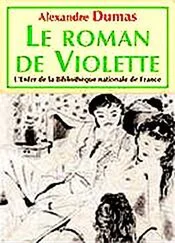The music that intoxicated the Huguenots was the voice of their pride.
The gleams which caught the eyes of the Parisians that midnight were the lightning flashes of their hatred illuminating the future.
And meantime everything was still festive within, and a murmur softer and more flattering than ever was at this moment pervading the Louvre, for the youthful bride, having laid aside her toilet of ceremony, her long mantle and flowing veil, had just returned to the ball-room, accompanied by the lovely Duchesse de Nevers, her most intimate friend, and led by her brother, Charles IX., who presented her to the principal guests.
The bride was the daughter of Henry II., was the pearl of the crown of France, was MARGUERITE DE VALOIS, whom in his familiar tenderness for her King Charles IX. always called “ ma soeur Margot ,” “my sister Margot.”
Assuredly never was any welcome, however flattering, more richly deserved than that which the new Queen of Navarre was at this moment receiving. Marguerite at this period was scarcely twenty, and she was already the object of all the poets’ eulogies, some of whom compared her to Aurora, others to Cytherea; she was, in truth, a beauty without rival in that court in which Catharine de Médicis had assembled the loveliest women she could find, to make of them her sirens.
Marguerite had black hair and a brilliant complexion; a voluptuous eye, veiled by long lashes; delicate coral lips; a slender neck; a graceful, opulent figure, and concealed in a satin slipper a tiny foot. The French, who possessed her, were proud to see such a lovely flower flourishing in their soil, and foreigners who passed through France returned home dazzled with her beauty if they had but seen her, and amazed at her knowledge if they had discoursed with her; for Marguerite was not only the loveliest, she was also the most erudite woman of her time, and every one was quoting the remark of an Italian scholar who had been presented to her, and who, after having conversed with her for an hour in Italian, Spanish, Latin, and Greek, had gone away saying:
“To see the court without seeing Marguerite de Valois is to see neither France nor the court.”
Thus addresses to King Charles IX. and the Queen of Navarre were not wanting. It is well known that the Huguenots were great hands at addresses. Many allusions to the past, many hints as to the future, were adroitly slipped into these harangues; but to all such allusions and speeches the King replied, with his pale lips and artificial smiles:
“In giving my sister Margot to Henry of Navarre, I give my sister to all the Protestants of the kingdom.”
This phrase assured some and made others smile, for it had really a double sense: the one paternal, with which Charles IX. would not load his mind; the other insulting to the bride, to her husband, and also to him who said it, for it recalled some scandalous rumors with which the chroniclers of the court had already found means to smirch the nuptial robe of Marguerite de Valois.
However, M. de Guise was conversing, as we have said, with Téligny; but he did not pay to the conversation such sustained attention but that he turned away somewhat, from time to time, to cast a glance at the group of ladies, in the centre of whom glittered the Queen of Navarre. When the princess’s eye thus met that of the young duke, a cloud seemed to over-spread that lovely brow, around which stars of diamonds formed a tremulous halo, and some agitating thought might be divined in her restless and impatient manner.
The Princess Claude, Marguerite’s eldest sister, who had been for some years married to the Duc de Lorraine, had observed this uneasiness, and was going up to her to inquire the cause, when all stood aside at the approach of the queen mother, who came forward, leaning on the arm of the young Prince de Condé, and the princess was thus suddenly separated from her sister. There was a general movement, by which the Duc de Guise profited to approach Madame de Nevers, his sister-inlaw, and Marguerite.
Madame de Lorraine, who had not lost sight of her sister, then remarked, instead of the cloud which she had before observed on her forehead, a burning blush come into her cheeks. The duke approached still nearer, and when he was within two steps of Marguerite, she appeared rather to feel than see his presence, and turned round, making a violent effort over herself in order to give her features an appearance of calmness and indifference. The duke, then respectfully bowing, murmured in a low tone,
“ Ipse attuli. ”
That meant: “I have brought it, or brought it myself.”
Marguerite returned the young duke’s bow, and as she straightened herself, replied, in the same tone,
“ Noctu pro more. ”
That meant: “To-night, as usual.”
These soft words, absorbed by the enormous collar which the princess wore, as in the bell of a speaking-trumpet, were heard only by the person to whom they were addressed; but brief as had been the conference, it doubtless composed all the young couple had to say, for after this exchange of two words for three, they separated, Marguerite more thoughtful and the duke with his brow less clouded than when they met. This little scene took place without the person most interested appearing to remark it, for the King of Navarre had eyes but for one lady, and she had around her a suite almost as numerous as that which followed Marguerite de Valois. This was the beautiful Madame de Sauve.
Charlotte de Beaune Semblançay, granddaughter of the unfortunate Semblançay, and wife of Simon de Fizes, Baron de Sauve, was one of the ladies-inwaiting to Catharine de Médicis, and one of the most redoubtable auxiliaries of this queen, who poured forth to her enemies love-philtres when she dared not pour out Florentine poison. Delicately fair, and by turns sparkling with vivacity or languishing in melancholy, always ready for love and intrigue, the two great occupations which for fifty years employed the court of the three succeeding kings — a woman in every acceptation of the word and in all the charm of the idea, from the blue eye languishing or flashing with fire to the small rebellious feet arched in their velvet slippers, Madame de Sauve had already for some months taken complete possession of every faculty of the King of Navarre, then beginning his career as a lover as well as a politician; thus it was that Marguerite de Valois, a magnificent and royal beauty, had not even excited admiration in her husband’s heart; and what was more strange, and astonished all the world, even from a soul so full of darkness and mystery, Catharine de Médicis, while she prosecuted her project of union between her daughter and the King of Navarre, had not ceased to favor almost openly his amour with Madame de Sauve. But despite this powerful aid, and despite the easy manners of the age, the lovely Charlotte had hitherto resisted; and this resistance, unheard of, incredible, unprecedented, even more than the beauty and wit of her who resisted, had excited in the heart of the Béarnais a passion which, unable to satisfy itself, had destroyed in the young king’s heart all timidity, pride, and even that carelessness, half philosophic, half indolent, which formed the basis of his character.
Madame de Sauve had been only a few minutes in the ballroom; from spite or grief she had at first resolved on not being present at her rival’s triumph, and under the pretext of an indisposition had allowed her husband, who had been for five years secretary of state, to go alone to the Louvre; but when Catharine de Médicis saw the baron without his wife, she asked the cause that kept her dear Charlotte away, and when she found that the indisposition was but slight, she wrote a few words to her, which the lady hastened to obey. Henry, sad as he had at first been at her absence, had yet breathed more freely when he saw M. de Sauve enter alone; but just as he was about to pay some court to the charming creature whom he was condemned, if not to love, at least to treat as his wife, he unexpectedly saw Madame de Sauve arise from the farther end of the gallery. He remained stationary on the spot, his eyes fastened on the Circe who enthralled him as if by magic chains, and instead of proceeding towards his wife, by a movement of hesitation which betrayed more astonishment than alarm he advanced to meet Madame de Sauve.
Читать дальше












